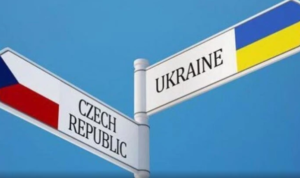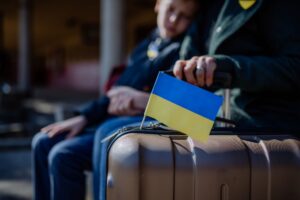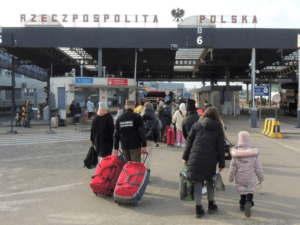
The new Czech government is working on changes to the rules on temporary protection and social support for Ukrainian citizens: assistance will focus on those who are objectively unable to support themselves (the elderly, people with disabilities, parents with young children), while payments for those who are able to work but are unemployed may be reduced or cancelled, according to Czech media reports. The Ukrainian publication ZN.ua, citing Novinky.cz, reports that the government is also preparing to adjust the conditions for temporary protection status. The specific parameters of the reform have not yet been made public.
According to Novinky.cz and previous EU decisions, temporary protection for Ukrainians in the Czech Republic will remain in effect until at least March 2027. In previous years, the government has already adjusted humanitarian payments (through Lex Ukrajina) and announced a transition to a more ‘activating’ model of support that encourages employment.
In June, the European Union agreed to extend the temporary protection mechanism until March 2027; Czech ministers had previously confirmed their commitment to longer-term protection with gradually increasing integration requirements (work, education, housing). Against the backdrop of these changes, the government is preparing further technical amendments to the national package of laws known as Lex Ukrajina.
After the publication of the government draft (expected in autumn-winter), the document must undergo interdepartmental approval and parliament. Details of the amounts and criteria for payments will be known from the text of the draft law and accompanying methodological materials from the Ministry of Labour.
Under temporary protection: there are currently approximately 395-400 thousand people in the Czech Republic (current estimates by the Czech media based on data from the Ministry of the Interior; in February 2025, the UNHCR recorded about 390 thousand).
The total number of Ukrainian citizens with various types of residence (officially registered foreigners) is approximately 560-581 thousand (data from the Czech Ministry of the Interior for Q1-Q2 2025). Informal/incomplete records may vary due to seasonal migration and repeated departures and arrivals; the total estimate in public sources is approximately 600 thousand.

US President Donald Trump’s administration plans to revoke the temporary legal status of some 240,000 Ukrainians fleeing the conflict with Russia, potentially putting them on a fast-track deportation path, Reuters reported on Thursday, citing senior officials and three sources familiar with the matter.
The publication writes that this is part of a broader effort by the Trump administration to revoke the legal status of more than 1.8 million migrants who are allowed to enter the United States under temporary humanitarian programs launched during the Biden administration.
It was previously reported that in January, the U.S. Citizenship and Immigration Services announced the suspension of the United for Ukraine program for Ukrainians fleeing war in the U.S. due to the January 20, 2025 executive order “Securing Our Borders.”

German Chancellor Olaf Scholz said that several hundred thousand more Ukrainians in the country should work, reports Tagesschau.
According to the publication, during a dialog with residents of the town of Teltow, Scholz said that, in his opinion, many Ukrainians receiving support in Germany should work.
According to him, the number of Ukrainians already having a job has increased to more than 200 thousand thanks to the government’s Jobturbo program.
“But there were still a few hundred thousand, if I can put it that way. That’s why I would like to see the work done,” he said.

Ireland will this week consider making cuts to state support for asylum seekers and refugees, including those who arrived from Ukraine, in a bid to bring the system more in line with other European countries, Prime Minister Simon Harris said on Monday.
Just over 100,000 Ukrainians have fled to Ireland since Russia’s invasion in February 2022, while the number of asylum seekers from the rest of the world almost trebled from pre-pandemic levels to more than 13,000 in 2022 and 2023. So far this year, the number has jumped to 7,700.
That has made immigration a much bigger political issue in the country of 5.3 million people, which is struggling to house refugees in the middle of a housing supply crisis.
“It certainly is my intention that we will see changes in a number of areas that do inject what I think Irish people believe has been lacking, which is that common sense approach,” Harris told Newstalk radio ahead of Tuesday’s cabinet meeting.
“We need to look at welfare consistency. We need to look at the contribution that people who have (refugee) status should make to accommodation. We need to look at making sure that anybody at work is working legally, that there are more workplace inspections.”
Harris said specifically that there should be a consistency of approach to people who come from Ukraine and that the support should not be based on when they arrived.
Ireland previously slashed the allowance for Ukrainian refugees using state accommodation who arrived after mid-March this year to 38.80 euros ($41.84) per week from 220 euros and put a 90-day limit on the time they can remain housed by the state.
The changes did not apply to the 70,000 Ukrainians who were already in some form of state accommodation.
($1 = 0.9273 euros)

Deputy Head of the Ministry of Internal Affairs of Poland and Commissioner of the Polish Government for Refugees Pavel Shefernaker said that from July 1, the Polish government will no longer pay 40 zlotys a day (about 276 UAH as of June 1) for food and accommodation for Ukrainian refugees and counts on their employment and self-sufficiency, Rzeczpospolita reports.
“We are convinced that many people in Poland are able to become independent and adapt,” Schefernaker told TVP Info, noting that there will be exceptions – for some refugees, benefits will be expanded, these are “disabled, pregnant women or large families.”
The report notes that the Polish government, in a special act on assistance to refugees from Ukraine, initially guaranteed the benefit for the first 60 days, and a month ago extended it for another 60 days, but there will be no further.
“We pay out huge social funds – from PLN 300 for each to PLN 500+ for each child, and other amounts arising from social benefits. In addition, we see that many Ukrainians are looking for work, finding it and coping with everything. We want encourage others to be active. Four months of full protection is, in our opinion, a sufficient period,” a senior politician from the Law and Justice party, who was not named, said in a commentary to the publication.
“Rzeczpospolita” also notes that the government’s decision is dictated by very high costs for the maintenance of refugees. In particular, the Silesian Voivodeship estimated the current costs of 115 thousand refugees at PLN 190 million per month, of which daily payments of PLN 40 per person amount to PLN 160 million.
“We are just starting a wide range of measures aimed at activating Ukrainians in employment. Already 14,000 of them, including 11,000 women, have found legal work in our region. We are waiting for a special act that will help finance Polish language education and refresher courses qualifications, which, of course, will help you find yourself in the labor market,” said the press secretary of the Silesian voivode Alina Kukharzhevskaya.
Mayor of Muszyna, Malopolska Voivodeship, Jan Golba noted that out of 1,300 refugees who once settled in the city, 400 now live in it, of which only 60 people have found work so far. “We hired a doctor, a dentist, nurses and kitchen assistants. It’s a lot and a little. Whoever wants to work will find a job. And who doesn’t want to, nothing will force him. If the government does not pay 40 they probably won’t make it,” he told the publication.
The official exchange rate of the NBU on June 1: 6.82 UAH/PLN

Bulgaria is resettling Ukrainian refugees from resort hotels by the sea to buffer centers in the cities of Sarafovo and Elhovo for further placement in other places of temporary accommodation in the interior of the country, according to the Bulgaria for Ukraine portal.
“We are ending the integration plan for the resettlement of refugees in the interior of the country, with which we sought to meet the needs of the people. All persons who are in hotels and say that they have nowhere to go will be temporarily placed in buffer centers in Sarafovo and Elhovo,” the source was quoted as saying. in the message, Deputy Prime Minister for Effective Public Administration of Bulgaria Kalina Konstantinova.
According to the new plan of the National Headquarters, all Ukrainian refugees will be temporarily placed in buffer centers before being resettled in places of temporary accommodation.
According to the Deputy Prime Minister, the authorities are currently determining the exact number of Ukrainians who have lost their homes at home and intend to take advantage of temporary asylum in Bulgaria.
“I urge those of you who do not need asylum to declare it now. This is the only way we can immediately take care of people who really need it,” Konstantinova stressed.
At the same time, persons who have refused humanitarian resettlement still have the right to free residence in Bulgaria until February 24, 2023, social benefits, the right to work and treatment.
As reported, Bulgaria’s new humanitarian program provides for the resettlement of refugees in lower-class housing, family hotels and guest houses. According to the certificate in the system of the Ministry of Tourism of Bulgaria, the possibility of accommodation in places 1 and 2 stars is 175 thousand beds.
Source: https://ukraine.gov.bg/